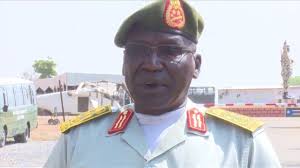South Sudan’s former chief of general staff, Paul Malong Awan said the “unknown gunmen” in the capital Juba responsible for the loss of lives and property are members of the country’s top security organs.
In a statement seen by Radio Tamazuj today, Malong accused members of the National Security Services and Military Intelligence of committing crimes against civilians in the name of unknown gunmen since conflict broke out in 2015.
“I have made a critical observation to security threat of South Sudanese and I have acutely found out that some elites in the government especially the NSS, MI, other operational security sects are using state apparatus, the likes of National Security Service, Military intelligence as a tool to advance the personal hatred against those they perceived to be their 'enemies',” the statement reads in part.
In the same statement, Malong accused the Vice President James Wani of attacking a US diplomat convoy in the South Sudanese capital, Juba in 2014.
Malong claims that after he was informed of the incident, “I took the matter of investigating the incident personally; luckily, I quickly found out that the Vice President convoy has shot the car of the US ambassador. I told the Vice president that your convoy has shot the car of the US ambassador the responsibility lies under your hand, however the Vice President ignored the case, blaming the whole incident to the unknown gunmen when the entirety is well known.”
“The morale is that the government of South Sudan is masking as the unknown gunman to its own citizens and the world at large just like the case of the US ambassador's car,” Malong wrote.
The South Sudanese government last month declared army chief of staff General Paul Malong a rebel and accused him of being behind an attack on government positions in Juba, an accusation he denied.




